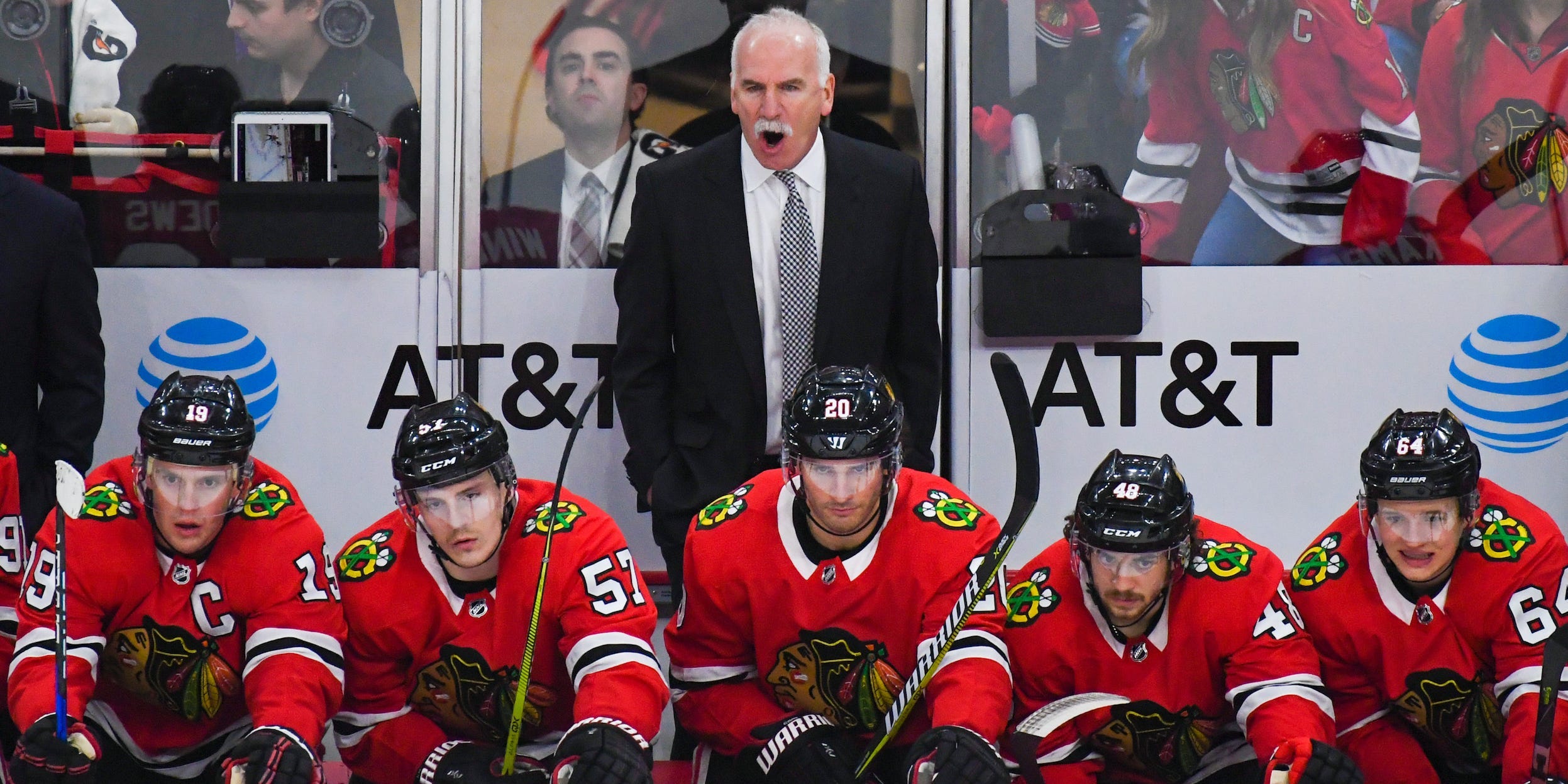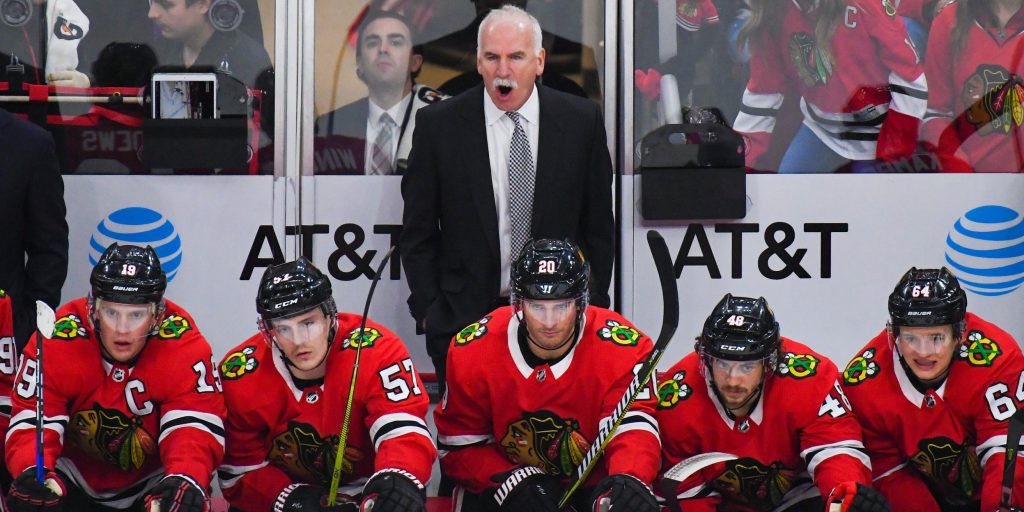
Patrick Gorski/Icon Sportswire via Getty Images
- Ice hockey has a documented problem of sexual assault and hazing.
- An independent investigation recently found that a Chicago Blackhawks coach sexually assaulted a player.
- The incident shines a light on a broad culture of silence across the sport's ranks.
Hockey has a problem with sexual assault and sexually charged hazing – not just in the NHL, but all the way down to the semi-pro and amateur ranks.
This week, Kyle Beach, a former Chicago Blackhawks prospect, came forward with allegations that the team's former video coach, Brad Aldrich, sexually assaulted him in 2010. Beach sued the team in May but had previously been kept anonymous. On Tuesday, the Blackhawks released the results of an independent investigation into the incident, which found that Aldrich had used threats to force Beach to perform oral sex on him. The team's top management had been informed shortly thereafter, the report showed, but did not take immediate action.
The revelations prompted top-level departures: The team's general manager, Stan Bowman, and the senior vice president of hockey operations, Al McIsaac, both left. And Joel Quenneville, who'd been the Blackhawks' head coach at the time, resigned from his current job as coach of the Florida Panthers.
The scandal, however, is just the latest incident in a broad and increasingly documented pattern within the game's most competitive circles: Players are incentivized to stay quiet in the face of hazing or sexual abuse, which leads to a culture of silence. That silence, however, is starting to be broken in court.
In a Canadian lawsuit, recent affidavits revealed that a teenager in the Ontario Hockey League was blindfolded and had his genitals mutilated in the 1979-80 season, and that an unnamed OHL player in the 1990s was "forced to masturbate and ejaculate on a piece of bread" in a competition with fellow rookies (with the threat that he or someone else would have to eat the bread if they were the last one).
The heart of the problem is what economists would call a "tournament system" - many enter the multi-tiered system of professional hockey, but few make it all the way to the NHL - so players who speak out about a coach or culture risk destroying all they've worked for.
'If you don't lay down and act like you enjoy it, I'll make sure you never play in the NHL or walk again'
The Blackhawks hired a law firm to conduct the investigation in response to Beach's lawsuit. The lawyers interviewed 139 witnesses, and the resulting 107-page report suggests that rumors of Beach's forced sex act were joked about within the organization and discussed at the highest levels in the buildup to the Blackhawks' 2010 Stanley Cup victory, the team's first since 1961.
Among the most damning parts of the report is a description of a 2010 meeting among the team's head coach, general manager, VP of hockey operations, executive vice president, and counselor. The group had learned about Beach's allegations against Aldrich from the Human Resources department, after Beach confided in the team's skills coach. But the top brass allowed Aldrich to stay until the end of the season, then leave quietly with a severance package, playoff bonus, and Stanley Cup ring.
Beach was 20 at the time, and he was traveling with the team as a "Black Ace": a minor leaguer called up for the playoff run in the event of injuries. So he was on the cusp of achieving his lifelong dream of playing in the NHL. He alleges that Aldrich used that to his advantage.
"John Doe recalled that Aldrich said words to the effect of, 'If you don't lay down and act like you enjoy it, I'll make sure you never play in the NHL or walk again,'" the report says, referring to Beach.
It also describes Beach's allegation that Aldrich once held up a baseball bat in an attempt to threaten him.
"You can't tell anyone about this; it is our little secret; no one can find out, or I will make sure you never play in the NHL," Beach recalled the coach saying, according to the report.
Aldrich has denied most of those allegations. He was convicted of sexually assaulting a 16-year-old player in Michigan in June.
Blackhawks CEO Danny Wirtz said in a briefing this week that he will instruct the club's legal team to find a "fair resolution" with Beach.
"We would like to acknowledge and commend Kyle Beach's courage in coming forward," Wirtz said. "As an organization, the Chicago Blackhawks reiterate our deepest apologies to him for what he has gone through and for the organization's failure to promptly respond when he bravely brought this matter to light in 2010. It was inexcusable for the then-executives of the Blackhawks organization to delay taking action regarding the reported sexual misconduct."
Similar issues in the NCAA and Canadian junior leagues
Hockey's lower ranks have seen their fair share of reports of hazing and sexual abuse, too.
In American college hockey, the most prominent example is a lawsuit against the University of Minnesota from a former recruit and four of his youth hockey teammates. They allege that a former assistant coach blindfolded them and tricked them into thinking a woman was performing oral sex on them. The group says the school of covered up the incident.
Those allegations date back to the 1980s, so lawyers for the University of Minnesota have been trying to get the suit dismissed for exceeding the statute of limitations.
In Canada, too, sexual abuse and hazing in hockey have prompted a kind of national reckoning in recent years. The CBC has compiled a list of documented hazing incidents going back to the early 2000s.
Unlike in the US, where playing for money disqualifies someone from playing in the NCAA, the best Canadian players strive for spots in the top three junior leagues. There, players ages 15 to 20 can play for money in front of NHL scouts. Beneath those tiers, players can also throw their hat in the ring for no money in the Junior B system.
Last year, 14 former junior players - including longtime NHL enforcer Daniel Carcillo - brought a class action lawsuit against the Canadian Hockey League, alleging that over more than three decades, rookie players were forced into "hyper-sexualized, homoerotic, and humiliating acts," according to Hockey News magazine.
One of the most well-known rites of passage in the Canadian junior leagues is the "sweat box," which crams rookies into the bathroom of a team bus or some other confined space. Affidavits in the class-action suit allege that some players, often undressed, were ordered to perform tasks ranging from getting their clothes out of a ball of tape to forced anal penetration, forced masturbation, or forced consumption of semen.
Given the past silence of team leaders, hockey's most vulnerable players - the teenagers in the junior ranks and the "Black Aces" vying for NHL glory - have stood little chance of finding justice.
Beach now plays professionally in Germany. As the video coach promised, he has never played a game in the NHL.

